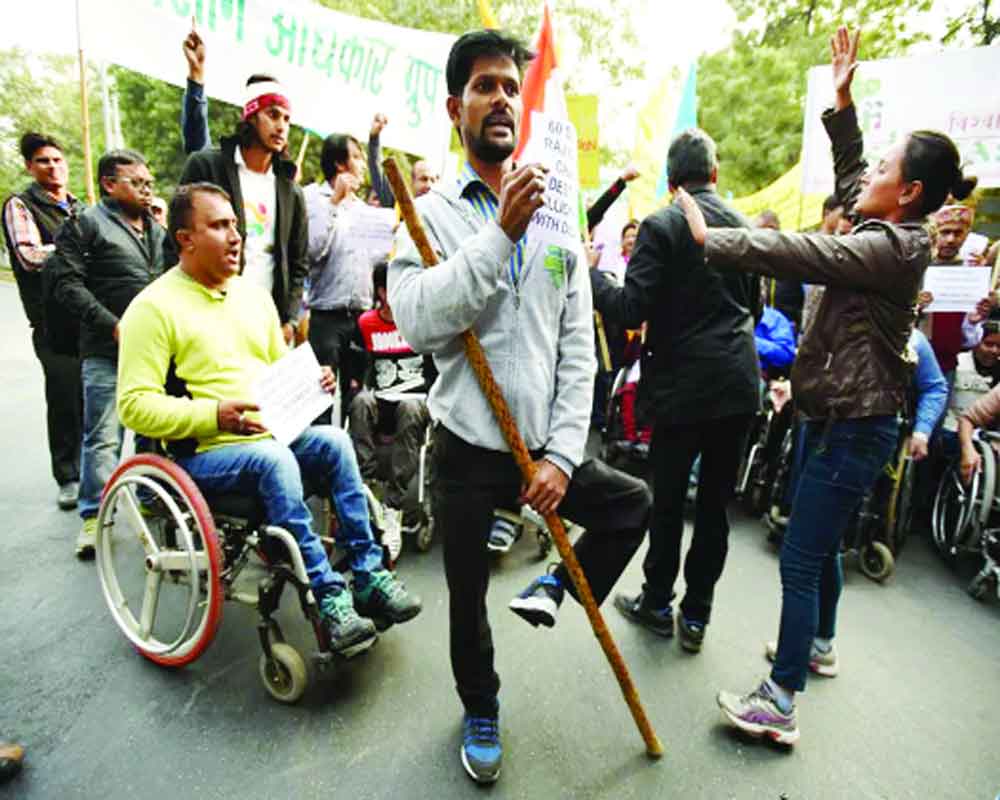Despite 2.68 crore persons with disabilities, the divyang community struggles to find representation in mainstream politics
In the vast landscape of Indian democracy, where diversity should thrive, the voices and needs of individuals with disabilities often echo in silence. Despite India accounting for 2.68 crore persons with disabilities, making up 2.28 per cent of the population as per Census 2011, the disabled community has been unable to find its place in mainstream politics.
With the Lok Sabha General Elections 2024 looming large and around the corner, a stark reality emerges: out of the 543 seats, not even one is occupied by a person with a disability. This absence speaks volumes, reflecting a systemic failure to acknowledge the rights and contributions of over 2.68 crore disabled individuals.
As the countdown to the elections intensifies, this leads us to critical questions. Why do the demands of persons with disabilities find little or no place in the manifestos of the political parties? Why do the exit polls overlook this significant demographic, pushing them to the sidelines of the demographic discourse? Can we truly celebrate the biggest festival of democracy with one of the significant sections of the population lagging behind?
A vicious cycle of exclusion persists when it comes to the political representation of persons with disabilities. Political parties often overlook people with disabilities, considering them a marginalised group who do not vote and are “incompetent” and “incapable” of creating any electoral impact. Professor Anita Ghai poignantly observes this disparity as “to be disabled is to be disabled by society.”
Too often, persons with disabilities are portrayed solely as objects of inspiration, highlighting their perceived “achievements” in crawling, reaching a polling booth and overcoming all the adversities. While these stories may momentarily touch hearts, they ultimately reinforce stereotypes, further excluding the disabled community from active participation in the electoral process.
Moreover, the physical barriers encountered at the polling stations compound the challenges faced by disabled voters, stripping away their dignity and agency. Lack of accessibility of polling stations and booths, absence of information, as well as inadequate capacity building of staff to support persons with disabilities, often make it difficult for disabled people to exercise their political rights.
For instance, during the Karnataka Assembly Elections held in 2023, when Anitha (38) arrived at the polling center, having traveled 20 km on her three-wheeled mobility bike, she was unable to make her way to the polling booth. There were no wheelchairs stocked at the facility. She says “The ramp was too narrow and could only accommodate a two-wheeler. It could not fit my three-wheeled assisted bike. The only person to ask for help was the security guard, who shrugged it off and told me to ‘manage’ like the other voters with disabilities, who were forced to crawl up the ramp, to the booth to cast their vote.” Anitha’s experience serves as a reminder of the systemic neglect that plagues our electoral infrastructure.
The challenges multiply for those with lesser known and lesser visible disabilities, such as those with blood disorders and intellectual and developmental disability. For example, the absence of sign language interpreters during political campaigns renders crucial information inaccessible, further alienating persons with speech and hearing impairments. In a democratic process that is built on inclusivity and fairness, these barriers erode the dignity of its disabled citizens, which it promised to uphold.
Further, the lack of concrete and official data exacerbates the situation. Without accurate statistics on the number of disabled voters who cast their votes and their representation in positions of power, policy formulation becomes a shot in the dark. The reliance on outdated figures, such as considering only 7 kinds of disabilities as against 21 as per the amended Rights of Persons with Disabilities Act (RPwD) 2016, further compounds the problem. This dearth of information results in a lack of targeted policies and inadequate budget allocations for persons with disabilities.
Yet, amidst these challenges lies an opportunity for transformation. The need is for persons with disabilities to be considered a part of the mainstream discourse around development. It is time to shift from a tokenistic approach to disability towards a more rights-based approach. Significantly, we need to move away from the traditional approach of treating disabled persons as mere beneficiaries and recipients of pensions and assistive devices.
As we mark 75 years of independence, the fundamental rights of persons with disability to participate in the civil and political systems of the State must be respected and honoured. This necessitates that persons with disabilities hold a seat at the table, with them being key stakeholders in designing and developing all policies and programs developed for them. Integration of the needs of the disabled community across all facets of governance is the need of the hour. I believe that it is only then that we can truly realise the vision of a ‘Viksit Bharat’ and propel India towards its aspiration of a $ 5 trillion economy.
(The writer is Program Officer-Advocacy, NCPEDP; views are personal)


























